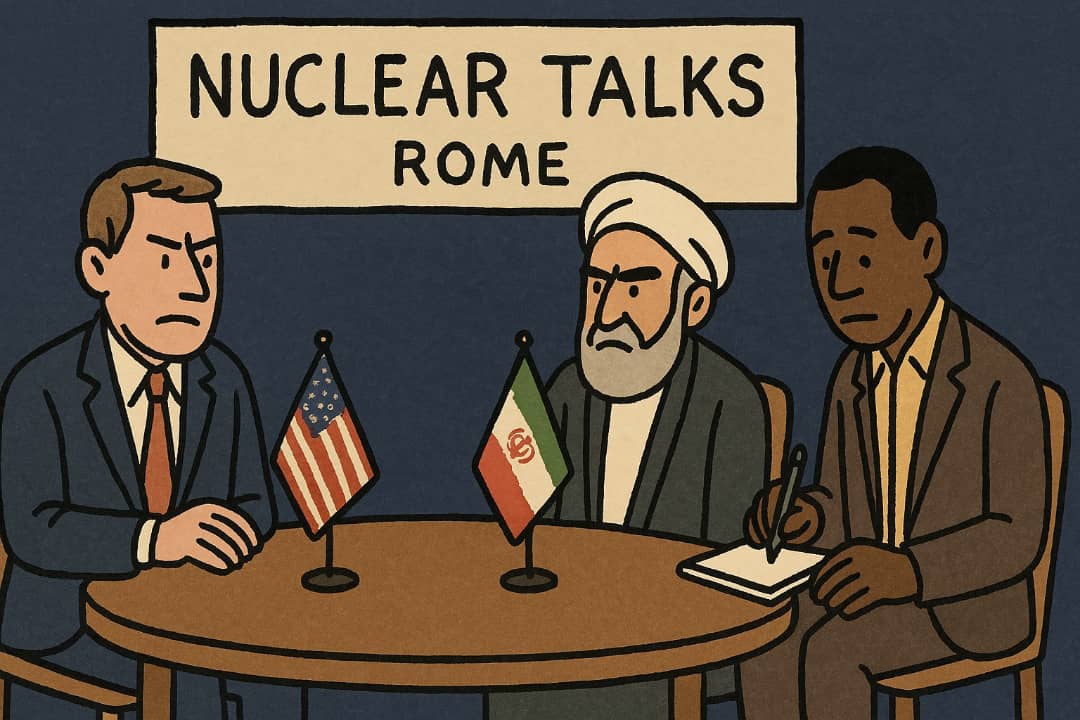International Affairs
Why U.S. and Iran Met in Rome for Nuclear Talks

U.S. and Iranian negotiators met in Rome on May 23, 2025, for another round of nuclear talks. This is the fifth time they are meeting to discuss how Iran manages its uranium enrichment and missile activities. The purpose of the talks is to make sure Iran does not build weapons that can cause trouble in the Middle East or start a race where other countries feel they must also build such weapons.
Iran says it is enriching uranium for peaceful reasons, like energy and medicine. The U.S. and other countries are worried that the same process can also help make nuclear bombs. This is why the U.S. wants Iran to stop making uranium at high levels and to reduce the number of machines, called centrifuges, that spin uranium to make it more powerful. These machines are useful for power but dangerous when used for weapons.
The two sides do not agree on many issues. Iran wants relief from economic sanctions. These are rules that stop Iran from doing business easily with other countries. Iran says these sanctions are hurting its people. The U.S. says it will only lift these sanctions if Iran agrees to limit its nuclear program and allow full checks by inspectors. The inspectors work with the International Atomic Energy Agency, which is responsible for checking nuclear activities in different countries.
Some progress has been made in the past rounds of talks, like agreeing on which nuclear sites can be inspected and how often. But there is still no agreement on how long Iran should stop high-level uranium enrichment or how long inspectors can stay in the country. The U.S. wants long-term limits. Iran wants a shorter timeline so it can return to full nuclear activities later if it chooses.
Rome was chosen as the meeting place because it is seen as a neutral location. The talks are not just between the U.S. and Iran. Some European countries are also involved as observers. These countries want to help both sides come to an agreement. They are worried that failure to agree may lead to more fighting or instability in the region. Countries like Israel and Saudi Arabia have said they will not accept a nuclear-armed Iran. This means there is pressure on all sides to find a peaceful answer.
The talks are happening behind closed doors, but some information is coming out from people close to the discussions. One issue that is slowing things down is Iran’s missile program. Iran is building missiles that can travel far distances. The U.S. wants to talk about this too, but Iran says the talks should only be about nuclear power. Iran sees its missiles as part of its defence.
Another issue is trust. In 2015, both sides signed a deal called the Joint Comprehensive Plan of Action (JCPOA). That deal limited Iran’s nuclear activities in exchange for lifting sanctions. But in 2018, the U.S. left the deal and reimposed sanctions. Iran then restarted some of its nuclear work. Because of this history, both sides now find it hard to trust each other. Iran wants written guarantees that any new agreement will not be canceled again. The U.S. government says it cannot make promises that future leaders will follow.
Some experts in international policy say the talks in Rome are very important. If the talks fail, Iran may continue to enrich uranium to higher levels. This could make other countries in the region want to do the same. If many countries in the Middle East have nuclear weapons or the ability to make them, it becomes harder to maintain peace. If the talks succeed, it can lead to more cooperation and less tension in the region.
People who follow these talks closely say that both sides are under pressure. Iran is dealing with a bad economy. It needs the sanctions to be lifted so it can trade more and improve living conditions. The U.S. government also wants to avoid another conflict in the Middle East. Many Americans do not want more wars. So both sides have something to gain if they can agree.
What people can try to understand from this situation is that global security depends on agreements like these. Countries do not always trust each other, but they can still talk and find middle ground. If they find ways to allow inspections and limit dangerous activities, it helps prevent future wars. That is why international talks, even when slow and difficult, are better than silence or threats.
The role of independent inspectors is also very important. They are the ones who check if both sides are following the rules. Their reports help the world know what is true and what is not. These inspectors use tools and scientific methods to test how much uranium is enriched, where it is kept, and what kind of machines are used.
People in other countries can learn from this by seeing how dialogue and negotiation can solve hard problems. Instead of going to war or making threats, sitting down and talking about the real issues can lead to peace. Even when both sides disagree, they can still listen and understand what the other side wants.
For those who want to follow these talks more closely, it is important to check updates from trusted sources like the International Atomic Energy Agency, the U.S. State Department, and official Iranian news releases. These sources provide facts without trying to cause fear or confusion. Social media often spreads unverified information, so it is better to rely on official channels.
The outcome of the Rome talks will not only affect Iran and the U.S. It will also affect global oil prices, regional peace, and the way other countries approach nuclear development. Nigeria, as an oil-producing country, is also linked to these outcomes. If oil prices go up because of tension in the Middle East, it may boost the Nigeria’s economy on the short run. But If peace is achieved, it could bring stability in oil supply and trade.
No matter the result of the Rome talks, it is clear that both sides still believe there is value in discussion. They may not agree today or tomorrow, but the fact that they are still meeting means they see hope for a solution. Peace takes time, and many talks may be needed before results show. This round in Rome is part of that process.


 Digital Hustle5 months ago
Digital Hustle5 months agoHow to Make Real Money Online Using Simple Ways

 Money Moves5 months ago
Money Moves5 months agoHow to Avoid Bank Account Problems

 Stay Human5 months ago
Stay Human5 months agoHow to Know If You Are Losing Your Human Side

 Money Moves5 months ago
Money Moves5 months agoSimple Ways to Make Money the Honest Way

 Local Genius Spotlight5 months ago
Local Genius Spotlight5 months agoSimple Steps That Made Ian Williams a Leader

 Money Moves5 months ago
Money Moves5 months agoHow to Make Money Without Stress

 Local Genius Spotlight5 months ago
Local Genius Spotlight5 months agoWays Small Entrepreneurs Grow from Nothing

 Money Moves5 months ago
Money Moves5 months agoHow to Build Wealth and Keep Your Time
































